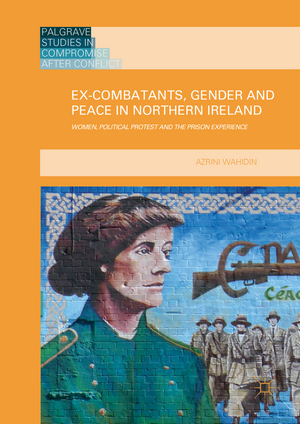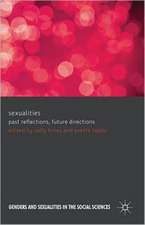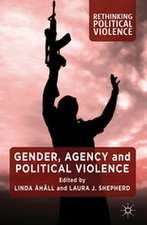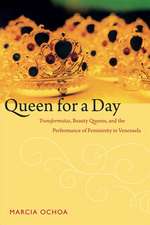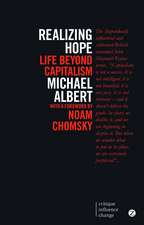Ex-Combatants, Gender and Peace in Northern Ireland: Women, Political Protest and the Prison Experience: Palgrave Studies in Compromise after Conflict
Autor Azrini Wahidinen Limba Engleză Hardback – 14 sep 2016
This book explores the contours of women's involvement in the Irish Republican Army, political protest and the prison experience in Northern Ireland. Through the voices of female and male combatants, it demonstrates that women remained marginal in the examination of imprisonment during the Conflict and in the negotiated peace process. However, the book shows that women performed a number of roles in war and peace that placed constructions of femininity in dissent.
Din seria Palgrave Studies in Compromise after Conflict
-
 Preț: 332.14 lei
Preț: 332.14 lei -
 Preț: 380.63 lei
Preț: 380.63 lei -
 Preț: 387.75 lei
Preț: 387.75 lei - 15%
 Preț: 642.03 lei
Preț: 642.03 lei -
 Preț: 387.20 lei
Preț: 387.20 lei - 15%
 Preț: 640.06 lei
Preț: 640.06 lei - 18%
 Preț: 953.20 lei
Preț: 953.20 lei - 18%
 Preț: 783.50 lei
Preț: 783.50 lei - 18%
 Preț: 730.35 lei
Preț: 730.35 lei - 18%
 Preț: 730.65 lei
Preț: 730.65 lei - 18%
 Preț: 789.83 lei
Preț: 789.83 lei - 15%
 Preț: 591.79 lei
Preț: 591.79 lei - 15%
 Preț: 527.79 lei
Preț: 527.79 lei - 15%
 Preț: 697.15 lei
Preț: 697.15 lei - 15%
 Preț: 528.13 lei
Preț: 528.13 lei - 15%
 Preț: 582.63 lei
Preț: 582.63 lei - 5%
 Preț: 1286.08 lei
Preț: 1286.08 lei - 15%
 Preț: 636.63 lei
Preț: 636.63 lei - 18%
 Preț: 783.50 lei
Preț: 783.50 lei - 15%
 Preț: 640.06 lei
Preț: 640.06 lei - 18%
 Preț: 725.61 lei
Preț: 725.61 lei -
 Preț: 319.81 lei
Preț: 319.81 lei - 15%
 Preț: 640.06 lei
Preț: 640.06 lei
Preț: 727.80 lei
Preț vechi: 887.55 lei
-18% Nou
Puncte Express: 1092
Preț estimativ în valută:
139.26€ • 145.40$ • 115.26£
139.26€ • 145.40$ • 115.26£
Carte tipărită la comandă
Livrare economică 04-18 aprilie
Preluare comenzi: 021 569.72.76
Specificații
ISBN-13: 9781137363299
ISBN-10: 1137363290
Pagini: 277
Ilustrații: XVII, 253 p.
Dimensiuni: 148 x 210 x 20 mm
Greutate: 0.45 kg
Ediția:1st ed. 2016
Editura: Palgrave Macmillan UK
Colecția Palgrave Macmillan
Seria Palgrave Studies in Compromise after Conflict
Locul publicării:London, United Kingdom
ISBN-10: 1137363290
Pagini: 277
Ilustrații: XVII, 253 p.
Dimensiuni: 148 x 210 x 20 mm
Greutate: 0.45 kg
Ediția:1st ed. 2016
Editura: Palgrave Macmillan UK
Colecția Palgrave Macmillan
Seria Palgrave Studies in Compromise after Conflict
Locul publicării:London, United Kingdom
Cuprins
Chapter 1. Women, War and Peace.- Chapter 2. An Cogadh Fada: The Legacy of Conflict in Northern Ireland.- Chapter 3. The Role of the Accidental Activist.- Chapter 4. From Footnote Soldiers to Frontline Soldiers.- Chapter 5. An Scéal o Príosún Ard Mhacha: Armagh Prison.- Chapter 6. Nor Meekly Serve My Time: 'A' Company Armagh.- Chapter 7. Parthas Caillte: The Politics of Resistance and the Role of the Gendered Incarcerated Body.- Chapter 8. Scéal Phríosún Ard Mhacha: The History of Strip Searching in Armagh.- Chapter 9. 'There is No Glory in Any War'. Conclusion. Compromise After Conflict: Making Peace with the Past.
Recenzii
“In Ex-Combatants, Gender and Peace in Northern Ireland, Wahidin uses interviews to expose the intimate and poignant accounts of the prison experience through a gendered lens. … It is a must-read to understand the integral role that female combatants had during the conflict and that female ex-combatants must have during social transformation for a solid and lasting peace. Wahidin’s work is a seminal text that should be read by everyone studying post-conflict reconstruction and peace-building.” (Ashleigh McFeeters, LSE, blogs.lse.ac.uk, February, 2017)
Notă biografică
Azrini Wahidin is Professor of Criminology and Criminal Justice at Nottingham Trent University, UK. She is on the Executive Committee of the British Society of Criminology and is Chair of the Professional Affairs and Ethics Committee. She has held visiting posts at Melbourne University, University of Sydney, Middle Tennessee State University and the University of Malaya.
Textul de pe ultima copertă
This book explores the contours of women's involvement in the Irish Republican Army, political protest and the prison experience in Northern Ireland. Through the voices of female and male combatants, it demonstrates that women remained marginal in the examination of imprisonment during the Conflict and in the negotiated peace process. However, the book shows that women performed a number of roles in war and peace that placed constructions of femininity in dissent.
